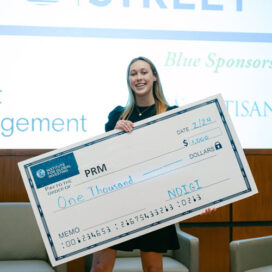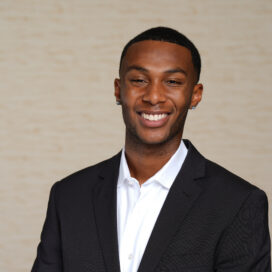Leadership is Learning to Listen: John Foley (EMBA ’20)
Published: October 2, 2020 / Author: Ryan Millbern
Leadership is Learning to Listen
In 2019, John Foley was a successful global account manager at Printpack, a world-leading flexible packaging company, using his knowledge of analytics and negotiation skills to drive business forward. He and his wife, Rossie, were raising a 4-year-old son, and tending to an increasingly full schedule. But Foley felt something was missing.

John Foley (EMBA ’20)
“I knew that in order to continue to grow professionally I needed to work on my emotional intelligence,” Foley said.
The Executive MBA program at Notre Dame gave him that opportunity from day one. Through the Executive Integral Leadership (EIL) course, Foley and the students in his cohort examined their core values and personal leadership styles through a series of exercises and conversations meant to promote reflection on what makes them effective leaders.
A former U.S. Army Captain who served in Honduras and South Korea, Foley likened the EIL experience to what an enlisted soldier might experience during boot camp.
“EIL is trying to answer the question: ‘How do you bring intelligent, successful people – all alpha males and females – together to work and collaborate when they’re used to running their own businesses?’” he said. “Executive Integral Leadership cements the class by building immediate trust among 40 strangers. It’s a very personal moment in all of our lives.”
Turning Weaknesses into Strengths
In addition to laying the foundation for close interpersonal relationships with members of his cohort, Foley found the Executive Integral Leadership experience laid bare his strengths and weaknesses.
“What I took from EIL is that there were definitely holes in my interpersonal skills and things that I haven’t fully reconciled as an adult that were limiting my ability to be more successful,” Foley noted.
Whether it was through the personal growth he experienced in Executive Integral Leadership or as a result of insights gleaned from Decision Making, a course Foley found particularly formative, he uncovered the importance of listening.
“Being a leader is learning how to really listen,” Foley says. “It’s no different than learning how to listen to your spouse—and if you’re a typical alpha it’s hard to retrain yourself.”
Explore Available Executive MBA Programs at Mendoza
Notre Dame Executive MBA – Chicago
Learn More
Notre Dame Executive MBA
Learn More
Setting Mi Parque Up for Future Success
During his cohort’s Consulting Immersion trip to Santiago, Chile, it was Foley and his classmates’ ability to listen to the needs of their partner organization that made a world of difference.
Fundación Mi Parque, a grassroots organization in Chile that helps vulnerable communities through the activation of public green spaces, needed to raise $15,000 to build a new park.
Foley and his peers embarked on a whirlwind fundraising effort. Within 36 hours, they secured the organization’s goal amount.
“We discovered that Mi Parque had a lot of transactional donors, but that very few people were committed on an annual basis,” Foley notes.
The EMBA cohort then advised Mi Parque to develop a pledge program that would ensure a steady stream of donations and offer the organization more long-term stability.
“We told them the money was unrestricted – they could either use it to build a new park or to invest in some of the initiatives we’d developed for them over the course of our work together,” Foley said. “We realized that the impact of building a park was transactional. By helping them develop their business processes, we hoped to compound the benefit for them.”
A Degree That’s Already Paying Dividends
Foley believes the return on investment of his Executive MBA degree resides in the changes that have taken place inside him.
“I walked away with a better understanding of my personal and professional goals. It took the entire program to figure that out,” he added. “In that particular regard it was worth the money. Just going through that, without anything else, will have an everlasting impact on my life for the better.”
His coworkers at Printpack have noticed the change.
“I’ve already gotten feedback about improved communication and collaboration,” Foley says. “Raw intelligence is just not enough. You get annual reviews and they’re all talking about the improvements they’ve seen. That’s been real tangible evidence. I wanted to work on my emotional intelligence, and I achieved my goal.”




